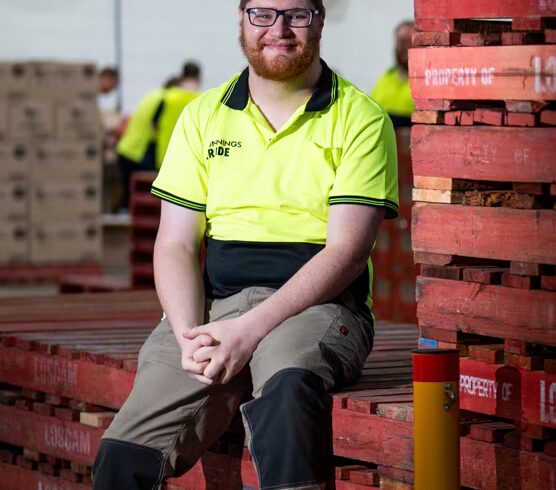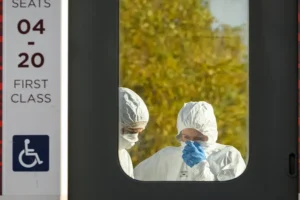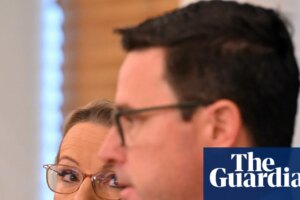
In the corner of a warehouse in Adelaide, the whirr and click of machines blend with the crinkling of chip packets as workers move with purpose on a production line.
They’re handling snack packs of chips at disability employer Orana’s Netley facility — and it is workers like Josh who keep it moving.
“There’s a quota we have to meet at the end of the day, so it keeps us very busy, but we absolutely love it,” Josh explained.
The Orana workplace in Netley. (ABC News: Che Chorley)
He’s been employed at Orana for five years and enjoys the variety of work and the friendships he’s made along the way.
“I’ve done work with wine, the chips, olive oil … sometimes I do team-leading roles, which is where I have to say to certain people, ‘This is how it has to be done’,” he said.
He’s one of about 15,000 Australians living with a disability who work in supported employment, an environment that’s also been described as sheltered or segregated.
It was a sector that was rocked in July, when the nation’s second-largest provider Bedford Group announced it was going into voluntary administration.
In a move to keep the doors open, the South Australian government stepped in and offered $15 million in the form of a secured loan and the purchase of Bedford’s Balyana site at Clapham.
Bedford Group announced it was going into voluntary administration in July. (ABC News: Olivia Mason)
Advisory firm McGrathNichol was brought in to assess the books and stabilise the company.
Later, the federal government provided a further $4.4 million to keep the operation working as the hunt for a buyer continued.
While the news of Bedford’s financial woes was a shock for many, it was not a surprise to some.
Bedford buyer sought as extra funding boost allocated
Many in the sector had been watching the company closely, including Orana.
“Most of the providers in SA in particular are really quite small, so they’re always waiting to see what some of the larger providers are going to do before they make any decisions or policy shift in the way that they manage their work,” Orana’s acting chief executive officer, Nicholas Mihalaras, explained.
Bedford had embarked on an ambitious five-year master plan to transform and set up social enterprises aimed at offering more work choices including open employment, where people living with a disability work in mainstream settings.
The transition involved a $45 million joint venture to build what was touted to be the nation’s largest social enterprise hub in Adelaide’s northern suburb of Salisbury, involving manufacturing and food and beverage supplies.
Bedford Group had been building a large social enterprise hub in Adelaide’s north. (ABC News: Will Hunter)
Construction began in 2023, but since the July announcement, the facility’s future is in doubt.
“It was a fairly brave and risky move, but they were large enough to probably take on that sort of a challenge,” Mr Mihalaras said.
“Some people were quite encouraged by what Bedford was doing. They thought it was quite entrepreneurial, even though it was risky.”
‘A tall ask’
The transition to a social enterprise model is a conversation dominating supported employment in the disability sector.
There’s a national push for providers like Bedford and Orana to pay award wages and to transform to offer inclusive, open employment in mainstream workplace settings.
This push was backed by the Disability Royal Commission, which recommended the federal government provide a transition plan for supported employers.
Nicholas Mihalaras is the acting CEO of Orana. (ABC News: Brant Cumming)
But there’s scepticism about how transitioning to social enterprise will work in an already competitive market and in an environment where the federal government is yet to provide a clear framework for navigating a transformation.
“Organisations for the last 20, 30, 40 years in disability have spent a lot of energy, because we think it’s the right thing to do, to try to get people into open employment,” Mr Mihalaras said.
“I’ve seen several models around the world where this has been attempted and I haven’t seen a successful model where intellectual disability has been integrated or transitioned successfully into open employment.
“People with intellectual disabilities need ongoing support. We have to compete against private organisations that do the same sort of work.
“It’s a pretty tough market, even for employers to survive. So yeah, I think it’s a tall ask.”
And it’s an ask in a volatile environment, with the latest State of the Disability Sector report painting a dire picture of providers in financial crisis.
Michael Perusco says organisations across the broader sector are doing it tough. (ABC News: Ashleigh Barraclough)
Michael Perusco is the chief executive officer of advocacy group National Disability Services (NDS).
He said organisations across the broader sector were doing it tough.
“Fifty per cent of quality providers are losing money, the rest are hardly breaking even,” he said.
“And when I say quality providers, I mean providers that have decades of experience, that are supporting people with complex needs.”
Mr Perusco said that disability providers “right across the country are under financial strain, extreme financial strain”.
“We know that 21 per cent of providers are looking to exit the market and we know that there is very low confidence within the provider market about things changing,” he said.
But government data showed in the June quarter there were 215,779 active providers delivering services through the NDIS — up from 167,409 in the same quarter a year earlier.
The NDS points the finger at pricing and inefficiencies under the National Disability Insurance Scheme (NDIS).
“There’s a one-size-fits-all approach to pricing, which means that you get the same price for supporting someone with very complex needs as you do for taking someone shopping,” Mr Perusco said.
“There are a lot of opportunities to improve the way it works, and that will lead to better value for money in the scheme and ensure that quality providers remain.”
Mr Perusco says disability providers across the country are “under financial strain”. (ABC News: Ashleigh Barraclough)
Orana’s Nicholas Mihalaras agrees, and raised the option of “policy that’s more targeted to the population it’s dealing with, or its funding — rather than having a practice or a policy that encompasses everybody with a disability”.
“There’s a lot more energy and effort that needs to go into people with intellectual disabilities from a support point of view and I don’t think that that is adequately recognised,” he said.
The NDS said there were some positive signs.
“We’re encouraged by the government’s signals around independent pricing and regulatory reform. We think it’s essential that our pricing is independent, that it is done in a rigorous way and it’s tiered,” Mr Perusco said.
The former federal minister for disability, who is now the federal opposition’s spokesperson on the issue, is South Australian senator Anne Ruston.
She said federal and state governments shouldered responsibility.
“NDIS is an amazing program,” Senator Ruston said.
“Perhaps it could have been better designed, but it certainly is something that we can all be very proud of.
“But what we’ve ended up with is a stoush between the federal government and the states and territories about who’s going to be paying for what, and at the end of the day that stoush is having terrible negative consequences and impacts on Australians who live with disabilities.”
Anne Ruston says the NDIS is ‘something that we can all be very proud of’. (ABC News: Matt Roberts)
On the eve of an expected announcement on the future of Bedford Group, there are calls for the federal government to provide a clear road map for organisations supporting those with complex needs.
“Something’s got to happen about the way that the system is operating to allow people to survive, and unless that changes, it’s not a very bright future for most organisations in this space,” Mr Mihalaras said.
“It would be a shame to see the industry extinguished over a period of time because I think it does give people with an intellectual disability a taste of just normal life.”
In a statement, a spokesperson for NDIS Minister Jenny McAllister said the federal government was “taking active steps to support provider viability and to strengthen the NDIS market”.
“This includes providing $45 million in funding for the quality supports pilots in therapy supports, supported independent living and support coordination,” they said.
The spokesperson also said the government was working closely with Bedford and advisor McGrathNicol as “arrangements are made for its long term future”.
“Our focus is on maintaining continuity of care and minimising disruption for participants,” the spokesperson said.
Workers at Orana handle snack packs of chips on a busy production line. (ABC News: Che Chorley)
From Josh’s perspective, the working life is one he loves.
“We hope to get new people to join us because we are running short on staff, or at least employees,” he said.
“But most of the time it’s … a beautiful environment. I love coming here.”
Source





